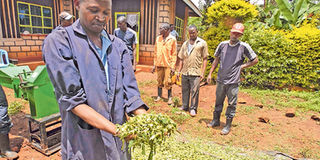We shred animal fodder for dairy farmers and get good income out of it

Dairy Ventures Self Help Group members during a fodder shredding session. They move from village to village and county to county shredding fodder for farmers. PHOTO | CAROLINE WAMBUI | NMG
What you need to know:
- Under the name Dairy Ventures Self Help Group, the youths dressed in navy-blue overcoats and black gumboots run the business, helping farmers shred the fodder at a fee.
- The members contributed Sh1,000 in a month, which was saved in a sacco. By early last year, the group had saved over Sh170,000 and they approached the Dutch organisation, which added them a similar amount, enabling them to purchase the fodder shredder at Sh340,000.
- The group also hires more hands at Sh500 per day, with the farmer providing transport and the wages as they cater for diesel that powers the shredder. In a good month, the group makes up to Sh220,000.
- According to him, the machine comes with different sieves that include grain without fodder, cobs and fine fodder, giving the farmer power to regulate the chopping sizes.
The grinding noise on a farm in Gankere sub-location, Imenti North, Meru County, attracts several villagers who are keen to know what is going on.
Drawing closer, one realises that the systematic noise is coming from a shredder, run by a group of youths, which is slicing maize plants into pieces.
Under the name Dairy Ventures Self Help Group, the youths dressed in navy-blue overcoats and black gumboots run the business, helping farmers shred the fodder at a fee.
“Our machine shreds both the pod and grains, unlike a chaff cutter that only chops,” says Stanley Muriithi, the group’s secretary.
Muriithi recounts that they formed the group soon after being trained by the Netherlands Development Organisation (SNV) on dairy management.
“We could not afford to go into dairy farming because of lack of capital but we saw a business opportunity in providing services to dairy farmers,” he says.
The members contributed Sh1,000 in a month, which was saved in a sacco. By early last year, the group had saved over Sh170,000 and they approached the Dutch organisation, which added them a similar amount, enabling them to purchase the fodder shredder at Sh340,000.
“We move from village to village or county to county shredding fodder for farmers. The machine shreds three tonnes per hour. We charge farmers Sh2,000 per hour and any member involved is paid Sh1,000 a day,” he explains, noting most of them have other jobs where they work as electricians, masons, drivers, carpenters and plumbers.
The group also hires more hands at Sh500 per day, with the farmer providing transport and the wages as they cater for diesel that powers the shredder. In a good month, the group makes up to Sh220,000.
“The machine shreds both the plants and the pod, opening the outer kennel and ensuring that the energy starch germ and the bran get mixed up, giving the farmer balanced fodder. The animals thus enjoy the full nutritional benefits of the fodder,” Murithi offers, noting they are 10 members in all.
SUSTAINABLE BUSINESS MODEL
Phillip Oketch, a dairy expert in Tharaka Nithi County with SNV, says, “Unlike a chaff cutter, the shredder is able to slice mature fodder, especially maize, that has gone beyond the dough stage. The former only chops it into wheels, a thing that translates to getting maize in the manure, a clear indication that it wasn’t digested. And because the testa wasn’t open, for the content in the grain to be shred and mixed into the fodder, the animal does not enjoy the nutrients from the plants and the grain.”

The youth demonstrate how they undertake their activities. With the services they offer, they are assured of a stable source of income all-year-round. PHOTO | CAROLINE WAMBUI | NMG
According to him, the machine comes with different sieves that include grain without fodder, cobs and fine fodder, giving the farmer power to regulate the chopping sizes.
Patrick Muriiki, the chairman of the group, says after chopping the fodder, they then ensile at a separate fee, immediately reducing the chances of losing nutritive value.
“When fodder is not cut or ensiled on the same day, there is loss of nutritional value as heating up starts and there is the yellowing of the leaves,” he explains.
One of the advantages they have is that the shredder is movable. “You can take it to the maize plantation and shred directly into a lorry or in a silage pit, which reduces costs. Once shredded, the bulkiness reduces, enabling the farmer to use one or two lorries, which is easier than ferrying the full maize plants,” Muriiki explains.
Some of the counties they have travelled to outside Meru to shred fodder and ensile for farmers include Kajiado, Nakuru, Tharaka Nithi, Embu and Laikipia.
The group has also leased a two-acre piece of land where they grow maize for ensiling at a cost of Sh25,000-Sh30,000. Each member of the group also owns on average 0.5 acres where they grow maize, shred and sell it.
“With the services, we are assured of a stable source of income all-year-round. In future, we plan to purchase a dairy cow for each of our members,” says Muriiki.
He adds that the business model is sustainable though there are times they lack farmers to shred fodder for.
“As any other business, there are peak and low seasons. The peak season is when most farmers are harvesting their maize and when this ends the low season sets in. Some farmers in Meru irrigate their maize, a thing that ensures that even during the low season, we still get some business.”





